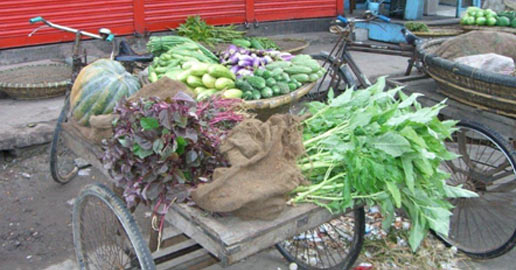Across India and Africa, there are already programs and policies in place which aim to help the poor. It makes sense to tap into these to benefit more farmers and help focus resources on agricultural water management.
Electrification
 In West Bengal, boro paddy has been in decline because farmers face difficulties tapping into groundwater.This is generally not a function of physical scarcity but of high diesel costs and low rates of rural electrification for tube wells. Natural recharge of groundwater supplies is high yet misconceptions persist and have led to restrictive policies.
In West Bengal, boro paddy has been in decline because farmers face difficulties tapping into groundwater.This is generally not a function of physical scarcity but of high diesel costs and low rates of rural electrification for tube wells. Natural recharge of groundwater supplies is high yet misconceptions persist and have led to restrictive policies.
Carefully crafted revisions to policies governing groundwater and provision of electricity could return West Bengal to the high rates of agricultural production it achieved in the late 1980s and early 1990s.
The State Water Investigation Directorate has already changed a provision of the West Bengal Groundwater Resources Management, Control and Regulation to release some smallholders from the requirements to obtain permits. And the State Electricity Distribution Company now only requires farmers to pay a fixed fee for new connections instead of the full cost of wires, poles and transformers.
Further policies could encourage farmers to make efficient use of groundwater, such as strict and intelligent rationing of power supply to farmers in the boro season, charging farmers a judicious mix of pro-rata and metered tariff.
Providing affordable electrical connections to half a million more electric pumps would allow for irrigation of an additional 3.7 million hectares of farm land. If only 50% of this potential is reached, the irrigated area would increase from 2.98 million ha to 4.83 million ha; 88% of the cultivated area.
Poverty Alleviation Programs
 There is opportunity to work hand in hand with schemes that already exist to help the poorest in rural communities. One example is the Mahatma Gandhi National Rural Employment Guarantee Scheme (MGNREGS) in India. Set up to address chronic rural poverty has been effective at developing water harvesting and storage structures. However, not all farmers can access this water because they do not have pumps.
There is opportunity to work hand in hand with schemes that already exist to help the poorest in rural communities. One example is the Mahatma Gandhi National Rural Employment Guarantee Scheme (MGNREGS) in India. Set up to address chronic rural poverty has been effective at developing water harvesting and storage structures. However, not all farmers can access this water because they do not have pumps.







